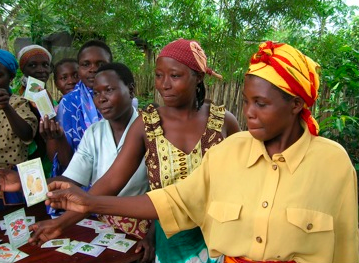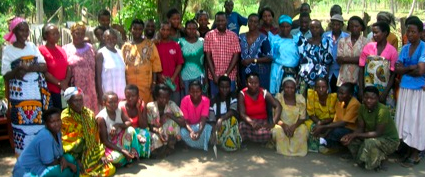The Garden of Life
The vendor’s stall attached to the front of the cinderblock house has only a few items for sale, but out back, the garden is flourishing. And the children—the ones peeking shyly from inside the stall and those playing beside the garden—have shiny, round faces reflecting their good health.

Launching this small business and household garden, and dozens like it in rural Uganda, is the work of Firelight grantee-partner CETRUD (Centre for Environment Technology and Rural Development).
Their approach is unique: most of the people they work with are living with HIV and caring for orphans whose parents have died of AIDS. CETRUD offers intensive training in income-generating activities, small grants (from $200 to $400), and long-term support to help the businesses thrive.
CETRUD calls the participants “caretakers,” emphasizing their role in caring for a business that will one day belong to the orphans and vulnerable children in their charge.
To participate, they agree to tell the children about their HIV-positive status and to train the older children in running the business. This way, the youth are able to keep the enterprise afloat if the women fall ill or their strength wanes.
The businesses include restaurants, used clothing stalls, and sewing shops, as well as small stores and farms. All of the participants learn organic gardening to help keep their families well nourished even during lean times.
Remarkably, 95 percent of CETRUD’s caretakers’ businesses are successful, an achievement that impressed Firelight staff.
“We saw business after business, garden after garden, and most importantly, child after child, flourishing under the care of empowered women,” reports Aili Langseth, Firelight program officer.
One of those women is Joanne.
With $400 in start-up funds from CETRUD, she built a small business and a three-room house over two years. She also earned enough to keep four children in school—her own two children and two orphaned relatives.
Sharing CETRUD’s Model for Growing Home-Based Businesses
Firelight recognized that the forethought, training, and long-term support CETRUD provides to its caretakers could be a model for other organizations. With Firelight’s assistance, CETRUD organized a four-day workshop on income-generating activities for all eight of Firelight’s Ugandan partners that included visits to the businesses.
Enabling organizations like CETRUD to become mentoring groups for other grantees reflects Firelight’s community-based emphasis. Firelight strives to invest in building the capacity of local organizations focused on orphans and vulnerable children while respecting and strengthening local ownership and leadership.
At the income-generating forum, CETRUD shared the incremental ways they involve community members in the project and solicit a commitment from them before offering a loan.
The process begins with trainings in business and farming, and then the participants are asked to start a garden, explained Godfrey Kasozi, CETRUD’s program director. Once the garden is underway, they are invited to develop a business plan to receive a loan.
Mr. Kasozi also discussed with Firelight’s other grantee-partners ways of relating to government representatives. CETRUD finds that being in good communication with local government officials often provides an important platform for advocating for increased spending on the needs of children and their caretakers.
Along with useful technical assistance for the participating organizations, the workshop was a source of encouragement for CETRUD.
“These exchange visits offer an invaluable opportunity to experience honest, direct feedback from peers,” noted Kasozi. “And that feedback helps us to be self-reflective, and to motivate and inspire us.”
He says he particularly appreciates the give-and-take he has had with Firelight Foundation staff. It’s an empowering feeling, he says, to “belong to a network” where he can share ideas and offer advice, and where his knowledge of local needs is highly valued.
First published in Firelight’s 2007 Annual Report, and updated in February 2010.



